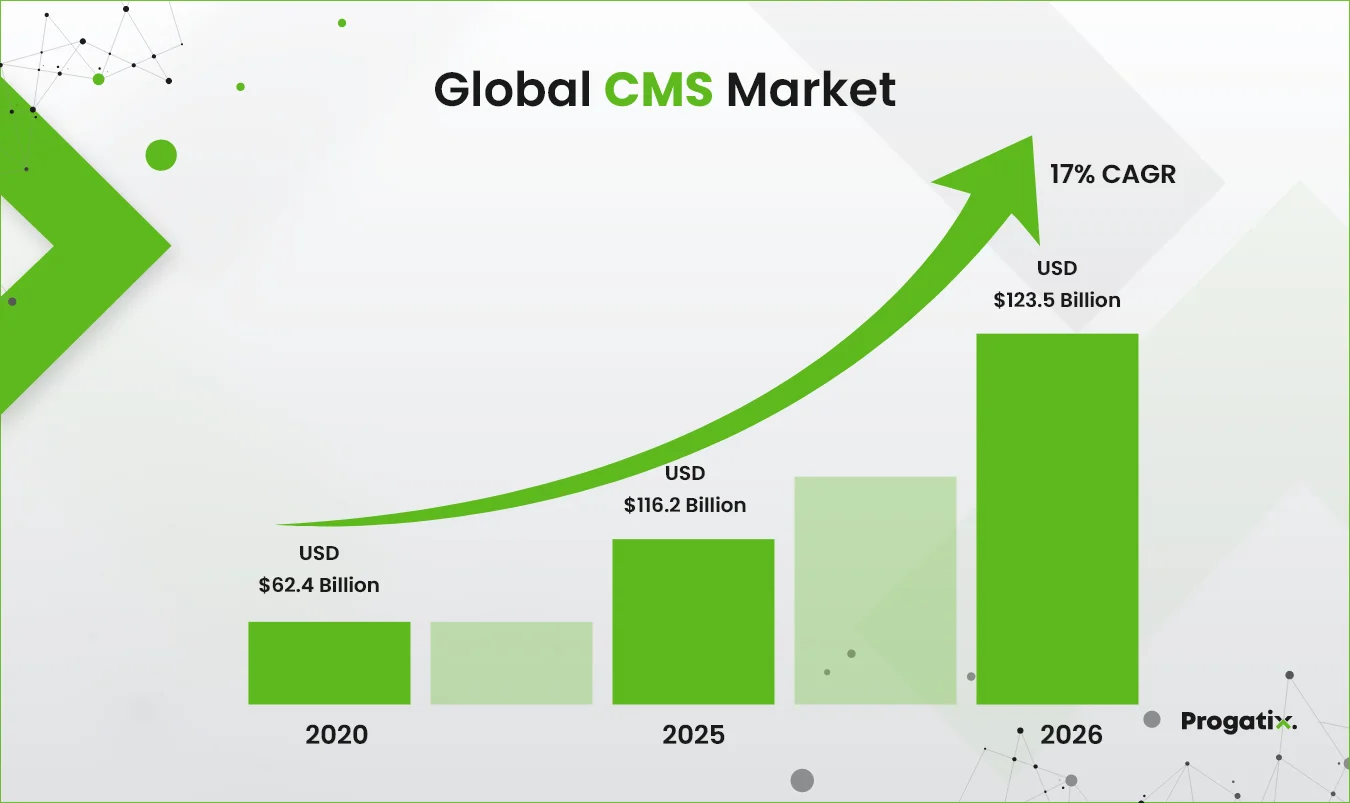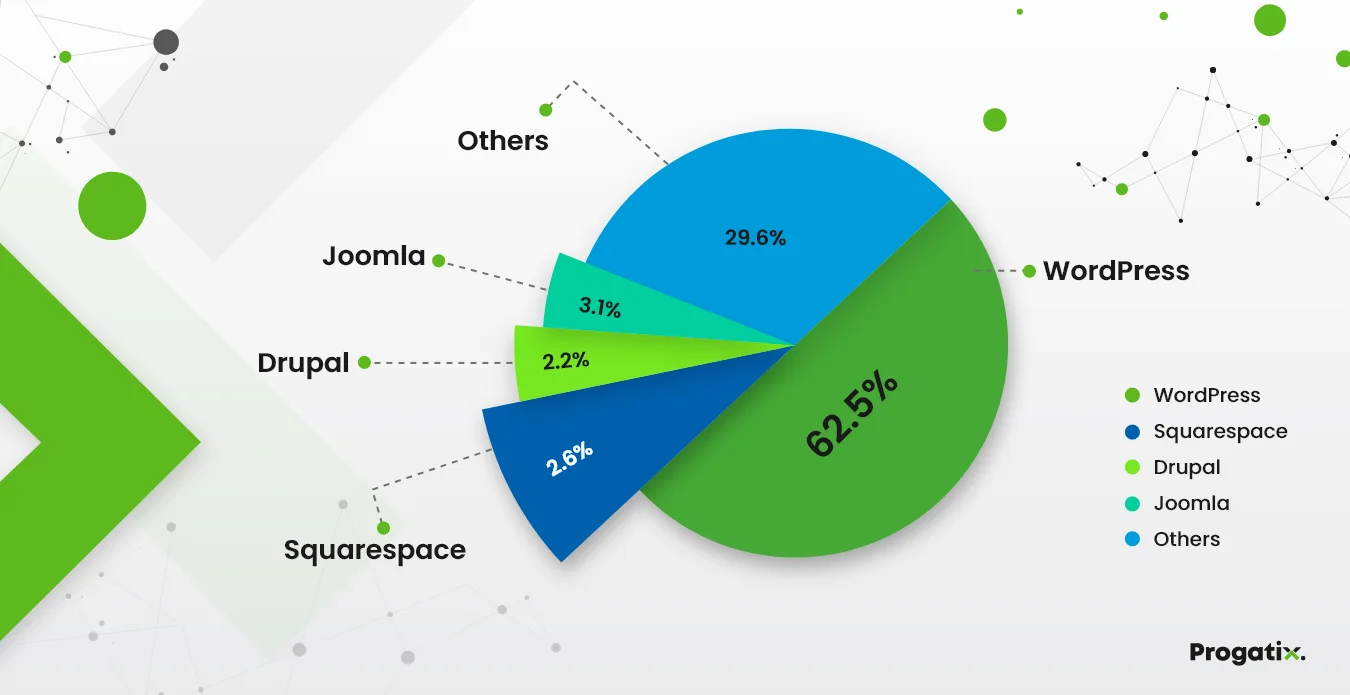Custom CMS Development: Benefits, Features & Cost Software Development

With a number of content management systems available in the market, the significance of customizing one for your business totally depends on whether you want to increase your business.
In 2020, the global CMS market was valued at around USD $62.4 Billion and is predicted to grow near USD $116.2 Billion by 2025 at a CAGR of 13.3%. However, by 2026, it is also expected to generate around $123.5 Billion at a CAGR of nearly 17%.
Source: openxcell
There are hundreds of CMS platforms available in the market, each holding its own exclusive functionality. Some of the best and the most commonly used CMS providers are:
- WordPress
- Drupal
- Optimizely CMS
- Contentful
- Squarespace
- Wix
Open-source CMS, including Drupal or WordPress, is publicly available and can be easily reallocated, modified, and copied for different purposes.
Source: openxcell
For instance, in 2018, WordPress used to power 34% of all the websites on the internet, and today, WordPress itself powers 65.2% of the market share all over the Content Management System industry.
Meanwhile, Squarespace, denoted as the top competitor of WordPress, holds a market share of only 2.6% per cent.
Drupal powers 2.2% of all websites, while Joomla powers 3.1% of websites all over the internet.
Alternatively, custom CMS software becomes an exclusive and proprietary solution created completely for one company or use case and, therefore, serves to expand a business, increase sales, improve services, and grow. Progatix Custom CMS solutions allow customizing the system’s workflow, design and usability according to any business or department’s specific requirements.
But what is a content management system? To help you understand CMS software, this blog will define everything you should know, including what it is, its benefits, features, development cost and why you should develop one for your business.
What is a Content Management System?
The term Content Management System or CMS denotes the software program planned and developed to simplify the creation and publication process of content over digital platforms. CMS software allows users to easily produce, shape, edit, and publish content devoid of any technical knowledge. It allows content creators and editors to seamlessly communicate using its user-friendly interface.
Custom content management system labels a platform exclusively tailored for an organization that helps manage diverse business website aspects, such as content marketing, e-commerce, and automated marketing.
Benefits of Custom CMS Software Development
The following are some reasons why one should invest in custom software development as a continuously growing business:
Better Functionality
Consuming an off-the-shelf CMS solution involves the user adjusting according to the specific features and functionalities. However, developing a custom CMS software solution for your business allows you to incorporate features and functions that fit your unique needs and requirements.
Improved Performance
In contrast to ready-made software systems established to be adaptable for the broader audience, a custom content management system does not comprise useless code pieces and only offers the features the client wants. This, in return, enhances the CMS platform’s loading speed, SEO rankings and overall performance.
Advanced Security
As an off-the-shelf code, open-source CMS can be accessed by everyone, which makes the susceptibilities transparent to the public and maximizes the risk of becoming a cyber-attacker’s target. However, in custom CMS, the code is only available to the development team or client, thus improving the platform’s security. Additionally, in a custom CMS, developers can also include innovative security features such as two-step authentication, SSL encryption, firewalls, etc.
Intuitive UI/UX
Ready-to-use CMS software provides a huge range of templates, colour patterns, and website-building features that may or may not fit business-specific requirements. However, custom CMS solutions are completely designed based on the brand identity recommendations provided by the client, making the UI/UX optimized and optimized for the users.
Higher Scalability
Custom CMS solutions are advanced by keeping in mind the business’s future plans and strategies, making scale, load, and platform’s future improvement easier.
Features of Custom CMS Software Development
Now that we know the custom CMS software and its benefits. Let’s move forward and learn about the categorically must-have features to integrate into it, and those features are:
Dashboards
Admin dashboard integration in the CMS solution allows you to deal with different tasks like user activity tracking, monitoring extortions, content scheduling, and analytics reviewing a lot easier.
Role-Based Access
The addition of this feature allows admins to agree on permissions for different users according to their roles. Simply put, role-based access helps the admin manage who can create, publish, edit, or delete platform content.
Customized Content Editing
This feature implication in the custom content management system allows non-tech users to smoothly update, publish, manage, and edit diverse content like images, text, videos, etc.
Responsive Design
Making the custom CMS approachable allows the system content to adjust according to the device’s diverse display sizes being used to access it.
Third-Party Tool Integration
It should also offer the ability to incorporate third-party tools and services to include programs that were not a part of the system previously, such as CRM systems, email outreach tools, chatbots, etc.
Version Control
Including version control in the custom CMS software allows admins to return to the preceding version if the new one is not working as predicted.
Analytics and Reporting
Including reporting and analytics tools in the custom CMS solution allows the admin to track user activities, conversion and bouncing rate, website traffic, etc.
SEO Tools
The custom CMS solution also involves built-in SEO tools helping users to create SEO-friendly URLs, besides checking the content’s readability score and keywords and Meta descriptions that help rank the content from search engine results pages.
When to Use Custom CMS Development
You must be thinking, when’s the perfect time to choose a custom CMS over an open-source one?
The following are some reasons that might make you reevaluate.
Outgrown open-source option
You might think it’s ample to use an open-source CMS, and the respective tools don’t constantly cater to your business’s specific requirements.
More Adaptability
Custom CMS development comes in handy, especially when you have an intricate and unique set of requirements, including more flexibility that an off-the-shelf solution can’t fulfil.
Customization
If you need your system to be more customized than those provided and know how to code, getting a custom CMS build can save a lot of problems in the long run.
Security
Custom CMS provide control over your site’s access and activity, keeping the security paramount.
Improved Website Experience
Custom-built systems are designed to run on the back end and make you feel native to your site, besides providing an overall optimal website experience for your visitors.
Cost to Develop Custom CMS Software
Custom CMS software development can cost you somewhere from $50,000 to $450,000. This development cost basically differs depending on the features, size, platform compatibility, complexity, tech stack, hourly cost, outsourced development team experience, configurations, etc.
However, this is just a rough estimate of the custom CMS software development cost. To get a precise development cost estimation, you need to communicate with our experts, share your project needs, outsource experienced developers, and decide on the technology along with required third-party integrations.
Custom CMS Web Development Cost Factors
Generally, the more complex your design and functionality involving the integration of new and different features, the higher the price. A standard platform like WordPress normally costs you less than a custom-made system. Similarly, a ten-page website’s development is cheaper than one with 100 pages. Other factors, including the testing, maintenance, and deployment, subsidize to the closing price set by the WordPress web development company.
Upfront Costs for Custom CMS Web Development
Custom CMS web development’s upfront cost usually depends on the following factors:
-
Development Time
The time consumed in the development depends on the project’s complexity. For example, the development of a small business website would take less time than the development of an enterprise solution involving numerous modules and functionality.
-
Size and Features
A standard CMS web design set might include a simple contact form, 15 pages, and automated sitemap generation. If you want more complex features like content image galleries, moderation tools, or e-commerce payment gateway integrations, make an initial quote request for it.
-
Development Team
Arranging an in-house team to create and maintain a custom CMS is more expensive than outsourcing. Also, finding the right WordPress development company with expertise in up-to-date development practices can also be challenging.
The cost of CMS web development varies significantly, beginning at a few hundred dollars and growing to tens of thousands. One reason for this wide range count is the CMS’s included features that can be used as basic as blogs and newsletters or complex like e-commerce sites and social media, as required. The more you want to make out of your website, the higher the price tag will be.
Ongoing Maintenance Costs for a Custom CMS
Some custom CMS developers offer an ongoing maintenance quote distinct from the initial build. It might be striking to assume it’s not worth paying, but keep these costs in mind in case. Ongoing website maintenance involves several different aspects, such as:
- Plugin and extension updates
- Website activity monitoring
- Website content updates
- Backup/restoration of files/data
- Security monitoring to secure against viruses and hacking attempts
- Performance monitoring ensures quick and efficient website loading across all devices and browsers
Initially, implementing a do-it-yourself approach towards custom CMS development appears to be the most suitable and affordable choice. Down the line, the web maintenance complexities start to expose themselves and create problems for business owners.
A custom CMS solution becomes crucial when companies begin to scale. Beginning with a CMS programmer in the very first place can save businesses the load of switching later. A professional web development team provides help in optimizing the digital experience for your customers by recommending options that best fit your company’s digital transformation journey.
Monthly Web Hosting Cost Factors
During the web hosting cost estimation, several factors require consideration. The main factors are the website’s size and the required features. For instance, a small personal site with a few pages might not require numerous resources, including disk space or bandwidth, and hence, it does not have numerous needs for expensive custom solutions.
Web hosting costs fluctuate depending on the number of services required by your website. Conversely, a large enterprise e-commerce site that needs to be operated 24/7 and has high traffic will comprise more demanding technology and server resource requirements, and such resource demands control the type of hosting you require.
The following are the common web hosting options:
- Shared Hosting – Shared web hosting involves CPU sharing with other websites, making it the cheapest but the slowest and most unstable option.
- VPS Hosting – A VPS hosting solution comprises a cloud-based server, besides offering the advantages of dedicated server hosting at a more reasonable price.
- Dedicated Server Hosting – Dedicated server hosting serves your website and proves to be more expensive but reliable.
Have you decided to get your website custom CMS development? Get help from Progatix custom software development services that provide a full-fledged content management system customized to cater to the customer’s requirements.




 Let's Discuss Your Tech Solutions
Let's Discuss Your Tech Solutions 






